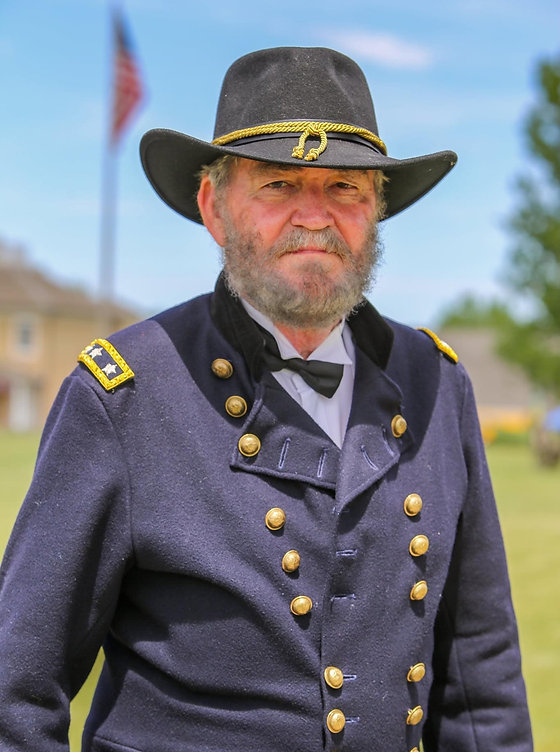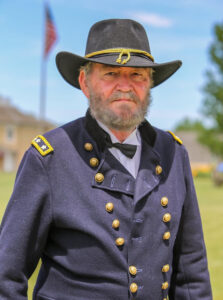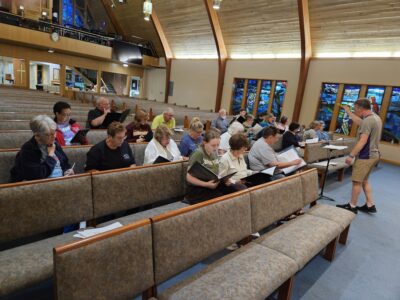Ulysses S. Grant performance at Mulberry Church Saturday
-
—Submitted photo by Jay Grammond
Peter Grady poses as President Ulysses S. Grant.

—Submitted photo by Jay Grammond
Peter Grady poses as President Ulysses S. Grant.
Pete Grady of Marshalltown will take on the personae of Ulysses S. Grant as he presents his original one-act show, “Unconditional Surrender: A visit with Ulysses S. Grant” Saturday.
The performance will begin at 1 p.m. at the Mulberry Center Church, located within the Wilson Brewer Park at 220 Ohio Street.
Grady, is an actor who has also been involved with the Marshalltown Community Theatre as a board member and directed in many productions. He wrote this original production and began performing this one-act show in 2012, after years reading and researching President Grant.
“I’ve had a long standing interest in history and a long standing interest in theatre and I have a resemblance to Ulysses S Grant,” explained Grady, when asked how he why he started doing these performances
The one hour show uses period music, photographs, cartoons, maps and drawings to explore Grant’s successes and failures in military and civilians life. The presentation will provide the audience with a new appreciation and understanding of the man who would serve the United States after the Civil War ended.
“Grant has received a lot more attention in the last few years than in the past,” he said, “It’s not an evolving thing, but there is so much professional research since I started this show.”
Talking with Grady about the show makes one feel like he truly knew him.
“He died so young, at 63 years of age,” he said, “In that period of time he lived a very consequential life for such a few years.”
Grady’s presentation will explore his personal achievements and personal losses, but the most inspiring aspect of his presentation was his devotion to his wife and family.
“When he died he was essentially penniless,” said Grady, ” In his last years, he was working on his biography, hoping that it would generate some income for his family after his death. First and foremost he was a family person, who wanted to care for his family after he died, he knew he was going to die.”
“That’s the most compelling part of this,” explained Grady.
Grady has been performing “Unconditional Surrender” over a hundred times throughout the midwest and across the country for organizations educating individuals on the impact of his years as President of the United States, and as the General who is credited with ending the Civil War.
Grady’s performance generally runs one hour. The presentation is free to the public, however donations are always welcome to help with maintenance on the Mulberry Center Church.
Background on Ulysses S. Grant: the man who saved the Union
The one-man show, performed by Pete Grady, was inspired by a friend tell him that he looked like Ulysses S. Grant. The thought of being a look alike eventually made Grady decide to write a play about Grant.
Pete Grady lives in Marshalltown. He is a 1975 graduate of St. Ambrose College, Davenport, and a 1984 graduate of the University of Iowa College of Law in Iowa City. He served in the Iowa Department of Justice as an Assistant Attorney General until his retirement in 2016.
Grady’s study of Grant, who was the 18th US President of the United States brought to light many personal issues he faced after the Civil War.
He struggled to rebuild his nation after the war, but foremost he was the husband and father whose final efforts were devoted to the financial support of his wife and family.
History of Grant
Hiram Ulysses Grant was born on April 27, 1822, in Point Pleasant, Ohio. Thefollowing year, he moved with his parents, Jesse Grant (1794-1873), and Hannah Simpson Grant (1798-1883), to Georgetown, Ohio, where his fatherran a tannery.
Ulysses S. Grant (1822-1885) commanded the victorious Union army duringthe American Civil War (1861-1865) and served as the 18th U.S. presidentfrom 1869 to 1877.
An Ohio native, Hiram Ulysses Grant graduated fromWest Point in 1843 and then became known as Ulysses S. Grant (because of amistake on his West Point recommendation letter) fought in the Mexican American War (1846-1848). During the Civil War, Grant, an aggressive and determined leader, was given command of all the U.S. armies.
When Grant’s forces attacked Fort Donellson and the Confederatecommander tried to negotiate, Grant replied that “no terms except an unconditional and immediate surrender can be accepted.” The subsequent capitulation earned him the nickname “Unconditional Surrender Grant” (a play on his initials).
It was during the American Civil War that Grant first major Union success cemented Grant’s reputation as a formidable commander. “He became the man of the hour to a Northern public starved for victories early in the war.
“Unconditional Surrender Grant” was a legend created by the Northern press, but it served him well. He never took credit for coining the phrase that first made him famous, and he remained the same man after the Battle of Fort Donelson, Tennessee in February 1862 as he had been before.”
The capture of Fort Donelson was the first major Union victory of the American Civil War and also marked a turning point in the career of Ulysses S. Grant, whose steadfastness and resolve during the battle, including his refusal to accept anything less than a complete and total Confederate surrender, catapulted him to fame.
What did Grant mean by unconditional surrender? “Unconditional Surrender” is a complete capitulation where a defeated party yields without any demands or conditions, leaving their fate entirely at the mercy of the victors.
After the war, he became a national hero, and the Republicans nominated him for president in 1868. The primary focus of Grant’s administration was Reconstruction, and he worked to reconcile the North and South while also attempting to protect the civil rights of newly freed Black slaves. While Grant was personally honest, some of his associates were corrupt and his administration was tarnished by various scandals. After retiring, Grant invested in a brokerage firm that went bankrupt, costing him his life savings.
He spent his final days penning his memoirs, which were published the year he died and proved a critical and financial success.
Grant died at age 63 on July 23rd, 1885, in Mount McGregor, New York, in the Adirondack Mountains, where he and his family were spending the summer.
His memoirs, published that same year by his friend Mark Twain (1835-1910), became a major financial success.



